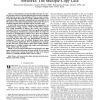Free Online Productivity Tools
i2Speak
i2Symbol
i2OCR
iTex2Img
iWeb2Print
iWeb2Shot
i2Type
iPdf2Split
iPdf2Merge
i2Bopomofo
i2Arabic
i2Style
i2Image
i2PDF
iLatex2Rtf
Sci2ools
142
click to vote
TON
2008
2008
Efficient routing in intermittently connected mobile networks: the multiple-copy case
Abstract--Intermittently connected mobile networks are wireless networks where most of the time there does not exist a complete path from the source to the destination. There are many real networks that follow this model, for example, wildlife tracking sensor networks, military networks, vehicular ad hoc networks, etc. In this context, conventional routing schemes fail, because they try to establish complete end-to-end paths, before any data is sent. To deal with such networks researchers have suggested to use flooding-based routing schemes. While flooding-based schemes have a high probability of delivery, they waste a lot of energy and suffer from severe contention which can significantly degrade their performance. Furthermore, proposed efforts to reduce the overhead of flooding-based schemes have often been plagued by large delays. With this in mind, we introduce a new family of routing schemes that "spray" a few message copies into the network, and then route each copy ind...
Related Content
| Added | 15 Dec 2010 |
| Updated | 15 Dec 2010 |
| Type | Journal |
| Year | 2008 |
| Where | TON |
| Authors | Thrasyvoulos Spyropoulos, Konstantinos Psounis, Cauligi S. Raghavendra |
Comments (0)

